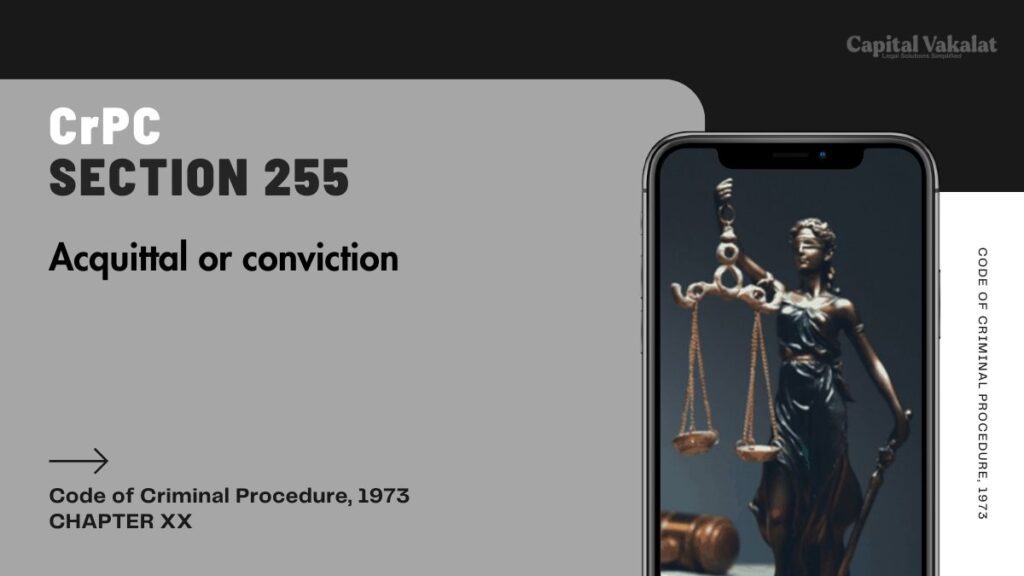The Code of Criminal Procedure (CRPC) serves as the backbone of criminal law in India, laying down the procedural requirements for the administration of justice. Section 255 CRPC stands out as a critical provision, delineating the judicial processes for acquittal or conviction in summary trials.

This article delves deep into the nuances of Section 255 CRPC, elucidating its significance, procedures, and the broader implications for the justice system.
Bare Act. Section 255 Cr.P.C.
Acquittal or conviction.
(1) If the Magistrate, upon taking the evidence referred to in section 254 and such further evidence, if any, as he may, of his own motion, cause to be produced, finds the accused not guilty, he shall record an order of acquittal.
(2) Where the Magistrate does not proceed in accordance with the provisions of section 325 or section 360, he shall, if he finds the accused guilty, pass sentence upon him according to law.
(3) A Magistrate may, under section 252 or section 255, convict the accused of any offence triable under this Chapter, which from the facts admitted or proved he appears to have committed, whatever may be the nature of the complaint or summons, if the Magistrate is satisfied that the accused would not be prejudiced thereby.
Section 255 CRPC: An Overview
Section 255 of the CRPC plays a pivotal role in summary trials, a streamlined judicial process designed to expedite the resolution of minor offenses. This provision empowers magistrates to decide upon the acquittal or conviction of the accused based on the evidence presented. By simplifying procedural requirements, Section 255 aims to ensure swift and efficient justice without compromising fairness.
Key Elements of Section 255 CRPC
To fully grasp the importance of Section 255 CRPC, it is essential to understand its key components:
Empowerment of Magistrates
Magistrates are vested with the authority to make determinations of guilt or innocence under this section. Their decisions are based on a thorough evaluation of the evidence and testimonies presented during the trial. This delegation of power underscores the trust placed in judicial officers to administer justice effectively.
Summary Trial Procedure
Summary trials under Section 255 CRPC are characterized by their expedited nature. These trials are typically conducted for offenses that are punishable by imprisonment not exceeding two years. The streamlined procedures reduce the burden on the judicial system, facilitating quicker resolution of cases.
Decisions Based on Evidence
The cornerstone of Section 255 CRPC is the reliance on evidence. Magistrates must carefully scrutinize the evidence presented, ensuring that their decisions are based on sound legal principles and factual accuracy. This emphasis on evidence upholds the integrity of the judicial process.
Acquittal under Section 255 CRPC
Acquittal is a significant outcome under Section 255 CRPC, signifying the accused’s release from charges due to insufficient evidence or failure to prove guilt beyond a reasonable doubt.
Criteria for Acquittal
To secure an acquittal, the defense must demonstrate the prosecution’s inability to establish guilt convincingly. The magistrate’s decision to acquit hinges on the principle of “innocent until proven guilty,” ensuring that no individual is wrongfully convicted.
Implications of Acquittal
An acquittal under Section 255 CRPC has profound implications. It not only signifies the end of legal proceedings for the accused but also restores their reputation and rights. Moreover, it underscores the importance of a fair trial and the protection of individual liberties.
Conviction under Section 255 CRPC
Conversely, a conviction under Section 255 CRPC entails the accused being found guilty of the charges brought against them. This outcome is based on the magistrate’s determination that the evidence conclusively establishes the accused’s guilt.
Criteria for Conviction
For a conviction to be secured, the prosecution must present compelling evidence that leaves no room for reasonable doubt. The magistrate’s role is to ensure that the evidence meets this stringent standard before rendering a guilty verdict.
Consequences of Conviction
A conviction under Section 255 CRPC carries serious consequences, including imprisonment, fines, or both, depending on the severity of the offense. Additionally, a conviction can have lasting repercussions on the individual’s personal and professional life.
Balancing Efficiency and Justice
Section 255 CRPC embodies the delicate balance between judicial efficiency and the principles of justice. While summary trials expedite legal proceedings, the emphasis on evidence ensures that decisions are not made arbitrarily. This balance is crucial in maintaining public confidence in the judicial system.
The Role of Legal Representation
Effective legal representation is paramount in summary trials under Section 255 CRPC. Both the prosecution and defense must present their cases convincingly, with a focus on evidence and legal arguments. Skilled legal counsel can significantly impact the outcome, highlighting the importance of competent advocacy.
Challenges and Criticisms
Despite its benefits, Section 255 CRPC is not without challenges and criticisms. Some argue that the expedited nature of summary trials may compromise thorough examination of evidence. Ensuring that justice is not sacrificed for efficiency remains a key concern.
Comparative Analysis with Other Jurisdictions
A comparative analysis with summary trial procedures in other jurisdictions provides valuable insights. Understanding how different legal systems balance efficiency and justice can inform improvements to Section 255 CRPC, fostering a more robust and equitable judicial process.
Future Perspectives
Looking ahead, the implementation of Section 255 CRPC could benefit from continuous evaluation and refinement. Integrating technological advancements, enhancing judicial training, and addressing procedural bottlenecks are essential steps towards a more effective and fair summary trial process.
Conclusion
Section 255 CRPC stands as a testament to the Indian legal system’s commitment to delivering swift and fair justice. By empowering magistrates to make informed decisions on acquittal or conviction, this provision streamlines judicial processes for minor offenses. However, the continuous evaluation and refinement of Section 255 CRPC are essential to balance efficiency with the principles of justice, ensuring that the rights of the accused are upheld and public confidence in the judicial system is maintained.